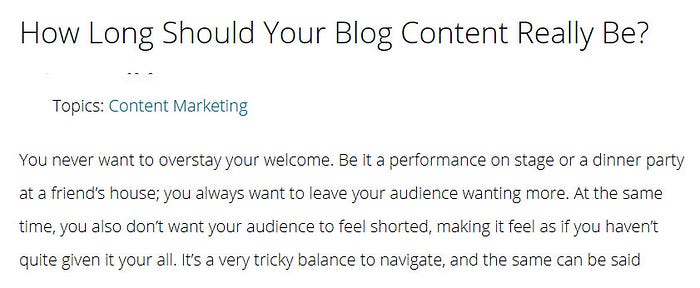Having Trouble Converting Blog Traffic Into Leads? This Might Be Why
You’re doing everything right — targeting keywords, ranking in Google, driving visitors to your site, and still, leads are barely trickling in.
So now you’re pulling your hair out wondering, “What could I possibly be doing wrong?”
Is my writing bad?
Is my offer not persuasive enough?!!
Or maybe my sales funnel is leaking?!!!
In moments like these, it’s tempting to over-analyze the situation and look for the most complex answer when in reality, the problem might not be complex at all.
Sometimes, it’s actually pretty elementary.
Sometimes, it’s as simple as the fact that you’ve just been trying to sell your offer to the wrong people.
Yes. You, my friend, might not have a funnel problem or copy problem. It’s possible that you’ve simply been driving the wrong traffic to your blog all along.
Now you might be thinking,
“We’re an email marketing business that blogs about email marketing. How is that even possible?”
Well, in this post I’m going to be sharing a common traffic pitfall which makes it in fact possible to blog about the right niche, create great content and even grow an email list whilst attracting the wrong audience.
The root of the problem- your keywords
Let me begin by asking a question,
“How do you choose which topics to blog about?”
Now, if you’re a good student of content marketing your answer was probably “keyword research”.
One of the first things you learn about content marketing is that to be found on Google (or any other search engine) you need to write blog posts around the “keywords” (aka search terms) your prospects are already using.
And how do you decide which keywords to target?
Well, most content marketing blogs will advise you to first create a mega list of possible keywords by:
-
Finding the keywords your competitors are targeting. Or,
-
Brain dumping any and every possible keyword even remotely related to your niche (That’s a real excerpt from a top marketing blog by the way). Or,
-
Running your initial ideas through a keyword tool to get even more keyword suggestions.
Then, once you have this mega list of ideas, you decide which keywords to target using the “low difficulty, high search volume” principle.
And what this means is that you run all your keywords through a tool like Moz and pick the ones that are easiest to rank for but still have a substantial amount of monthly search traffic.
Now, while I firmly agree with the concept of writing posts around keywords, I however disagree with “how” content marketers are often taught to select those keywords.
The problem with keyword selection for business blogs
Coming up with an initial keyword list using a method like competitor research and then basing your final selection on a metric like “search volume” is great- if you’re a business that directly monetizes traffic or sells an extremely “beginner-level” product at an extremely affordable price point.
However, for businesses that either:
a) Generate income by converting traffic into leads and then customers/clients. Or,
b) Sell a more advanced or high-ticket product or service.
..this method omits two very important factors every marketer must consider before writing down a single potential keyword or topic idea.
-
The “specifics” of your buyer persona. And,
-
The “specifics” of your offer
Props to Devesh Khanal over at Grow and Convert whose post on customer-content fit inspired these factors.
In trying to chase search volume many businesses forget that their aim isn’t to “attract the most people” or even to “attract the most people interested in a particular topic”.
As a business, your aim with every piece of content you create should be to attract a very particular type of prospect.
Let’s use an example to illustrate this point:
The keywords (and content) that will attract an executive at a multi-million dollar company with a $20,000 budget will be vastly different from the keywords (and content) that will attract a freelancer looking to spend 50 bucks a month. Even if they are searching for the exact same “type” of product- say, an accounting tool.
Now, unless you have an offer (product or service) that perfectly satisfies the needs of all possible buyer segments (features, ease, budget), your primary concern when selecting keywords or topic ideas should be first and foremost,
“What will appeal specifically to the prospect my product/service best serves?”
Not brain-dumping any and every possible keyword related to your niche.
Not copying competitors who you have absolutely no idea whether their content marketing is working.
And not evaluating the value of potential keywords based on which ones have more monthly searches.
Your first order of business in generating or evaluating any keyword or topic idea should be whether your ideal client would:
1. Be searching for that term in the first place
Let’s assume you’re a business selling high ticket accounting services for multi-million dollar tech companies.
Now, although this is a field I know next to nothing about, I’m pretty certain that very few executives considering switching to a new accounting firm to manage the financial records for their $50million dollars in yearly revenue will search for the term “How do I file taxes for my business?”
2. Find the content valuable
I’m also pretty certain these executives wouldn’t find a post about “3 ways to save up to $1000 during tax season” of particular value considering, you know ……their almost $10million dollar tax bill.
3. Consider you a subject matter expert after reading your content.
It’s also very unlikely that after reading your post discussing “What are taxes?”, our exec is going to walk away thinking “hmm such great definition skills. I should definitely contact this person to run the accounting for our multimillion-dollar company”.
But, on a more serious note,
Businesses that fail to factor in these two foundational considerations when choosing blog topics run the risk of making a mistake many business blogs do -
Creating content that is too broad, too simple, or completely irrelevant to their ideal client.
And, as a result, keep attracting visitors that never convert into leads even though everything seems to be working on paper.
A real-world application
To further illustrate this point, let’s use an example of two fictional businesses selling the same product.
Introducing-
Business A and business B (How original I know)
Now, businesses A and B sell high-ticket done-for-you content marketing services which typically cost about 10 grand in monthly retainers.
And as an inbound marketing channel, both businesses have active blogs where they publish new blog posts every week.
But, although both businesses blog about the same subject- content marketing, they cover very different topics and consequently attract very different audiences.
Business A publishes content like this:

And this-

While business B publishes content like this on its blog:

And this-

Now, based on the information above, which blog do you think is likely to attract the right type of traffic and convert that traffic into leads for either of these businesses?
It’s obvious, isn’t it?
Business B’s blog.
Why?
Because while both blogs might successfully attract visitors, only business B’s blog would attract the specific type of visitor that wants (or can even afford) their specific offer.
The people who can afford a $10,000 retainer aren’t interested in “the importance of a good heading” or “how long your blog posts should be”.
That’s not the type of information they would search for, value, or consider business A an expert for providing.
And that’s most definitely not the type of information that would convince them to book a call to potentially fork over 10 grand a month to them.
To recap
One of the first and easiest ways to troubleshoot your business blog is to start from the top — by validating whether or not you’re driving the right type of traffic.
And, if it turns out that you in fact have a traffic problem; a good place to begin is by rethinking your approach to keyword selection.
Instead of taking the traditional route to keyword research, ask yourself,
Would my ideal client search for this content, find this content valuable, and consider me a subject matter expert after reading it?
If the answer is no, ignore the enticing search volume or the fact everyone seems to be writing about it. Instead, head back to the drawing board, rinse, and repeat.
After months of lurking, I'm challenging myself to actually start contributing to the community. I'm starting by republishing some of my Medium posts - like this one. Here's to hoping I can keep it up!
Ps. If you read through the entire post, thank you! And if you got some value out of it well.............geez thanks I guess
Pps. - If you have any questions, feel free to drop them below. I don't consider myself a marketer (more a marketing writer that likes to study how the engine ticks along) but, I'll do my best to answer any questions all the same
